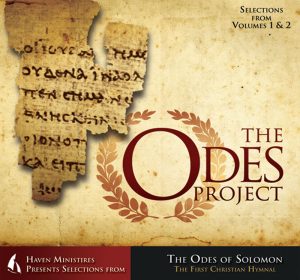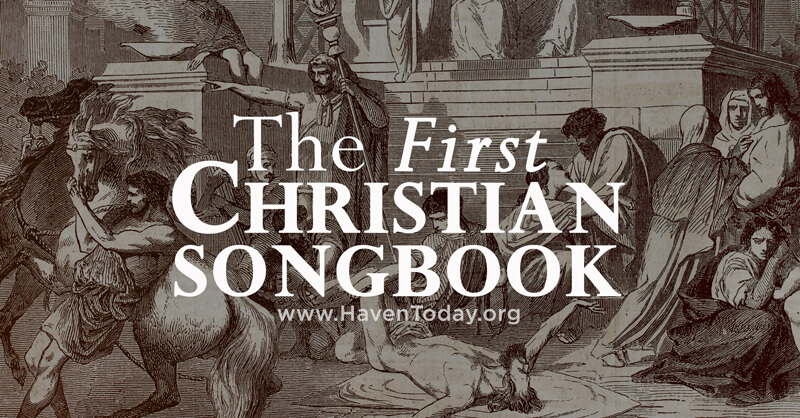Have you ever wondered what it would be like to worship with the first followers of Jesus? Thanks to an early 20th century discovery that led to the translation and thoughtful production of The Odes Project (2008), we can actually get a taste of what authentic Christian worship would have been like nearly 2,000 years ago.
In 1909, J.R. Harris discovered fragments of what are now known as “The Odes of Solomon.” Written between 80 AD and 125 AD in Ancient Syriac and Greek, these 42 Odes were penned at the dawn of Christianity, shedding new light on how the first Christians worshiped.
Out of all the music and literature that have been uncovered from this early era in church history, the Odes have held up the most to Scriptural integrity. Another characteristic of this ancient hymnal that scholars have pointed out is the striking similarities this collection has to the Old Testament Psalms.
In the video below, Fernando Ortega performs a captivating rendition of Sing Allelu. Click here to listen to more sample tracks from The Odes Project.
Who wrote the Odes?
This is still a mystery. Many scholars have speculated that the writer was a disciple of John, or at least a strong admirer of his letters to the early church. This is mostly due to the strong connection they have to themes found in the Gospel of John, such as light and life.
But as amazing as this discovery is, it wasn’t well known until a few years ago when Dr. Charles Fromm teamed up with composer John Schreiner to adapt the English translation of these early Christian songs into music. The Odes Project reflects on the music, themes, and time-period of when these songs of praise were originally sung.
To put it into context, many of the Christians at this time would have been facing stark persecution by Roman authorities. At times, Christians were taken away and brutally killed in the public arena for their faith. Therefore, early Christ followers had to worship in secret. They would meet privately in houses or catacombs, praying they wouldn’t be caught.
In this video, Dr. James Charlesworth, the man who translated the Odes into English, offers a vivid picture of the first century Christian context:
Ode 5 offers a profound look into the mindset of these early believers:
I Shall Stand
I thank you O Lord because I love You
I praise you O Lord I will not fear
Freely did I receive Your grace
You won’t forsake me
For You are my hope, You are my hope
Oppressors will come, let them not see me
Let darkness like a cloud fall on their eyes
So they won’t take a hold upon me
Hallelujah for my salvation
Though all things visible should perish
And everything should be shaken
I shall stand, I shall stand, I shall stand for the Lord is with me
Though all things visible should perish
And even if everything should be shaken
I shall stand, I shall stand, I shall stand for the Lord is with me
He is a garland upon my head
And I shall never be moved
In Him is all my confidence
The Lord is with me and I am with Him
These words show us the powerful faith and courage the early believers needed to worship Christ together.
Fortunately for modern believers in North America, we live in a time and culture where most people understand the concept of tolerance. Though religious persecution continues to happen everyday around the world, many of us will never know the same oppression that these early believers faced every day.
Yet even now, though we are separated by two millennia, we can join our ancient brothers and sisters in Christ by worshipping our Messiah with the same words they would have used so long ago—and the same Spirit that indwells us all.
To learn more about The Odes Discovery and hear more of these ancient hymns, click here to listen to the full audio series that includes interviews with scholars and more music from this historic album.
Corum Hughes works on the production team for HAVEN Today and is the managing editor of the All About Jesus blog. His passions include running, biking, reading, watching movies, and seeking Jesus in places He is seldom sought. Corum lives with his wife in Idaho.
 The Odes Project
The Odes Project
This recently discovered collection of ancient hymns is known as the “The Odes,” and The Odes Project sets these hymns to music for the first time in 2000 years. Blending ancient and modern styles of music, this unique Christ-centered CD powerfully leads our hearts in worship.



15 Comments
This is a wonderful ‘discovery’ and as an Orthodox Christian I’m happy to see more about our faith in the news. However, I’m currently to know why you chose to set these beautiful & holy odes to modern music. The Byzantine style of chanting, still used today, would have been more appropriate and a more accurate representation of how these odes might have been sung/chanted, if they’d been set to music.
Thank you.
Hi Patrice. Thanks for sharing. We weren’t the ones who set these Odes to music, but I believe the producers chose a slow meditative style with modern instruments to build a contextual bridge to the first century worshipers, rather than trying to totally reenact the original sound. I agree it would be fascinating to listen to this in the Byzantine style of changing, which would be closer to first century music. But this is all we have so far. Again, thanks for your comment.
God bless you all members of haven today
Can I get a copy of the words of the odes. It’s sometimes hard to understand the words when they are sung? Also, they would be great a a tool for worship.
Hi Ellie, there is text for each ode included in the jacket of the CD. But if you just wanted to read the Odes, you can visit https://theodesproject.com/read-the-odes/ where they have them all listed.
Bad link to the odes lyrics
Looks like the previous official website is no longer up. This is a link that should do better: http://gnosis.org/library/odes.htm
Looking for lyrics to sing with songs as we destress inroad work waiting. Akponcholady @ gmail .com.
Hi Yolanda. Thanks for getting in touch. I just sent you an email with the link.
I received a cd from Haven Today and have enjoyed the music very much. I also have a problem understanding the words and would like a copy of the lyrics so we can sing along. I have vol.1&2 of The Odes Project. I removed the slip and only the 14 titles are listed. I have found Odes of Solomon on web site, THE GNOSTIC SOCIETY LIBRARY , Gnostic Scriptures and Fragments. Is this the same odes the words are much different. The only one I have compared is Ode #40 and it has six different lines. Thanks!
Hi Ronald. Thanks for getting in touch! Lyrics used to be posted on theodesproject.com, but it looks like that domain no longer exists. I will email you a document I have with many of the lyrics written out. I hope that helps.
Trying to get lyrics of both albums. I listen to them on Spotify. Great discovery and project
Hi Bill. I’m glad to hear you’re enjoying the Odes. There used to be a dedicated site to the Odes Discovery where you could easily locate lyrics from the project. I can’t find that now, but here is a link to a website that also seems to have published the lyrics translated by James Charlesworth. Otherwise, the album sleeve would have the lyrics, too. I hope this helps!
I have loved The Odes Project for a good while and was disappointed to see that the website is no longer active. I recall them having resources with melody lines and chords for the recorded pieces, but have not been able to find that again. Might you have any clue regarding such a resource?
Or would you be willing to share the document that you have mentioned in previous comments with the lyrics of the Odes Project songs? I would be most grateful for any assistance!
Hi Marilyn. This link should have all the lyrics you’re looking for: http://gnosis.org/library/odes.htm
1 Trackback or Pingback